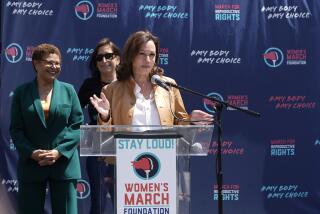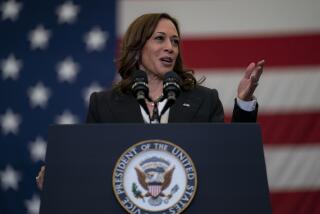Analysis: Hillary Clinton will be a commanding front-runner facing high expectations
Hillary Rodham Clinton will enter the 2016 Democratic presidential race — finally, officially — as the most commanding front-runner in generations. Yet her path to the White House will not be easy, much less assured.
For every advantage she carries an offsetting burden, along with the weight of exceedingly high expectations.
Clinton is beloved and widely admired. She is also loathed and widely criticized.
She boasts an unprecedented resume — former first lady, New York senator, secretary of State — and enjoys universal name recognition after more than two decades of near-constant presence on the national stage. That familiarity, however, will make it exceedingly difficult for Clinton to present herself as someone fresh and different — qualities voters often crave, especially at the tail end of a two-term presidency.
After more than a year of speculation and anticipation, Clinton is expected to formally launch her campaign Sunday with a video announcement, followed by a trip to Iowa, which is set to begin the presidential balloting next winter.
She is running, as yet, with little serious opposition for the Democratic nomination, which gives Clinton the chance to hew toward the political center and reach from the start for the independent and less-ideological voters needed to win a general election.
But it also denies her the competition that could toughen a candidate who, nearly eight years removed from her 2008 presidential bid, seems nowhere near top fighting trim.
And there are those expectations, which afford a Democratic challenger, however viable, the opportunity to show up Clinton by performing even halfway decently in an early contest; 16.5% of the Iowa vote was enough to launch Gary Hart into a serious contest against former Vice President Walter Mondale, who started 1984 as a formidable front-runner.
That would present a significant heap of challenges for even a candidate as supple as Clinton’s husband, Bill. He was, however, a rare talent. Hillary Clinton, by contrast, has proved a much better author, celebrity, role model and discussant of public policy than political campaigner.
She can be warm and engaging in small settings but dull and distant before large crowds. Her speeches are more workmanlike than uplifting. Her relations with the political press corps have been brittle even on the best days and that, in turn, has helped perpetuate a reputation for coldness and calculation.
Still, one thing Clinton has repeatedly demonstrated in a long public life is tenacity and resilience.
For that reason, many Democrats are convinced Clinton will be a better candidate than in 2008, when she also started as an overwhelming favorite but lost the party’s nomination to President Obama, in no small part because of the air of entitlement that suffused her campaign.
“She seems ready to run for this not like a front-runner but like someone interested in earning every vote because of what she stands for and where she wants to take the country, as opposed to who she is,” said Steve McMahon, a Democrat strategist who is supporting Clinton but not working for her campaign.
It is impossible, of course, to introduce Clinton to voters as though for the first time. But in the days after her announcement, campaign strategists will place her in surroundings they hope will start to refashion some less-than-flattering perceptions.
There will be no splashy rallies, arena-size appearances or major policy speeches, at least to start. Rather, Clinton will be sitting down to talk issues with voters in more intimate settings, telegraphing a message, it is hoped, of humility, empathy and approachability.
It is a technique that worked when Clinton, still living in the White House and facing the inevitable charge of carpet-bagging opportunism, conducted a “listening tour” of New York as a prelude to her successful 2000 U.S. Senate run.
“Those are the kinds of settings where she’s best,” in good part because she enjoys herself the most in smaller, more casual encounters, said Paul Begala, who has been close to both Clintons for decades. “It’s also a good antidote to, ‘I’m rich. I’m famous. I’m powerful.’”
(Begala, a top strategist in Bill Clinton’s 1992 presidential campaign and a veteran of his White House, has an advisory role with a pro-Hillary Clinton political action committee, which forbids him from direct conversations with the candidate or her campaign about strategy.)
The slow ramping-up will also give Clinton’s fledging campaign team, currently a thrown-together mix of volunteers, staffers-in-waiting and longtime family friends, associates and retainers, a chance to impose a more formal and disciplined structure. Fundraising will be an early and important priority.
That said, no election takes places in a vacuum. Matters involving the candidate’s personality, her presentation and the campaign process are all within the jurisdiction of Clinton and her strategists, at least to some degree. What cannot be controlled are some of the larger forces she — or any Democrat, for that matter — will face as the party’s 2016 standard-bearer.
Only one time in the last 65-plus years has a political party managed to string together three consecutive White House victories; the candidate who achieved that, Republican Vice President George H.W. Bush, did so in 1988 under a president, Ronald Reagan, who was more popular than Obama is today.
The bias toward stability that often helps incumbents win reelection seems to yield to a hunger for change by the time a party has spent eight years in the White House.
In Clinton’s case, it helps that she is bidding to make history as the country’s first woman president. For all her familiarity, that alone argues against the business-as-usual, more-of-the-same case that Republicans are prepared to make against her for the next many months.
But there again Clinton must be careful, lest her candidacy becomes too much about her and history rather than voters’ more pressing and personal concerns.
Clinton has enjoyed a brilliant career and her sterling past helped place her in the strong position she boasts on the brink of her announcement. But elections are inevitably about the future and Clinton will have to face resolutely forward if she hopes to move ahead and, after November 2016, into the White House.
Follow @markzbarabak for national & California politics
More to Read
Get the L.A. Times Politics newsletter
Deeply reported insights into legislation, politics and policy from Sacramento, Washington and beyond. In your inbox three times per week.
You may occasionally receive promotional content from the Los Angeles Times.







